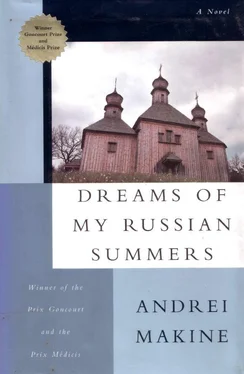She did not have the time to finish her sentence. The water streamed under our feet, carrying away my clothes, several sheets of paper, and one of Charlotte's espadrilles. The sky, gorged with rain, burst upon the steppe. We rushed to rescue what we still could. I seized my trousers and my shirt, which had happily caught on the branches of the willows as they floated along, and I just managed to fish out Charlotte's espadrille. Then the sheets of paper – they were the recopied translations. The downpour quickly turned them into little balls spotted with ink.
We did not notice our fear – the violence of the thunder's deafening clatter drove out all thought. The cloudburst isolated us inside the shivering confines of our bodies. With a thrilling keenness we felt our hearts laid bare, drowned in this deluge that merged heaven and earth.
A few minutes later the sun shone. From the top of the bank we contemplated the steppe. Shining, quivering with a thousand iridescent sparks, it seemed to be breathing. We exchanged smiling looks. Charlotte had lost her white headscarf; her wet hair was streaming in swarthy braids on her shoulders. Raindrops glittered on her eyelashes. Her dress, quite soaked, clung to her body. "She is young. And very beautiful. In spite of everything," declared that involuntary voice within me that disobeys and embarrasses us with its uncompromising frankness, but which reveals what is censored by considered speech.
We stopped at the railway embankment. In the distance we could see a long freight train approaching. Often a panting train would stop at this point, barring our path for a brief moment. This obstruction, due no doubt to some points or a signal, would amuse us. The cars rose up in a gigantic wall, covered in dust. A dense wave of heat was given off by their sides exposed to the sun. And the silence of the steppe was only broken by the distant hooting of the locomotive. Each time I was tempted not to wait for it to move off, and to cross the track by slipping under a car, Charlotte would restrain me, saying she had just heard the whistle. Sometimes when our wait was really becoming too long, we climbed onto the open deck, which freight cars had at that time, and got off on the other side of the track. These few seconds were filled with gleeful nervousness: what if the train set off and took us to an unknown and fabulous destination?
This time we could not wait. Soaked as we were, we needed to reach home before nightfall. I climbed up first and held out my hand to Charlotte, who stepped up onto the footboard. Just at that moment the train moved off. We ran across the deck. I could still have jumped. But not Charlotte… We stood facing the embrasure, which was filling with an increasingly biting draft. The line of our footpath vanished in the immensity of the steppe.
We were not at all worried. We knew that one station or another would halt the progress of our train. It seemed to me that Charlotte was in some ways quite pleased with our unexpected adventure. She gazed at the plain, revived by the storm. Her hair, blowing in the wind, spread across her face. She flung it aside from time to time with a rapid gesture. Despite the sun, a little fine rain began to fall at intervals. Charlotte smiled at me through this shining veil.
What suddenly struck me on this lurching deck in the middle of the steppe was like the wonder experienced by a child who, after long, fruitless study, discovers a character or an object that has been camouflaged in the cleverly jumbled lines of a drawing. Now he sees it, and the arabesques of the drawing acquire a new meaning, a new life…
It was the same with my internal perception. All at once I saw! Or rather I felt, with all my being, the luminous tie that linked this moment full of iridescent reflections to other moments I had inhabited in the past: that evening long ago with Charlotte, the melancholy cry of the Kukushka; then that Parisian morning, shrouded in my imagination in sunlit mist; that moment at night on the raft with my first lover, when the great riverboat towered above our entwined bodies; and the evening gatherings of my childhood, lived, it already seemed, in another life… Linked together thus, these moments formed a singular universe, with its own rhythm, its particular air and sun. Another planet, almost. A planet where the death of this woman with her big gray eyes became inconceivable. Where a woman's body was reflected in a series of dreamed moments. Where my "language of amazement" would be comprehensible to others.
This planet was the same world that was unfolding as our wagon hurtled along. Yes, the same station where the train finally came to a halt. The same empty platform, washed by the downpour. Those same rare passersby with their mundane concerns. The same world, but seen differently.
As I helped Charlotte to step down, I tried to grasp this "differently." Yes, to see this other planet, one would have to behave in a special way. But how?
"Come, we're going to have something to eat," my grandmother said, drawing me away from my musings, and she set off for the restaurant located in one of the wings of the station.
The room was empty, the tables were not laid. We sat down near an open window, through which a square lined with trees could be seen. On the front of the apartment blocks were visible long strips of red calico with their customary slogans glorifying the Party, the Fatherland, and Peace… A waiter came up and told us in a sullen voice that the storm had cut off their electricity and that the restaurant was therefore closing. I was already about to get up, but Charlotte insisted with extreme politeness, which, with its old-fashioned turns of phrase that I knew to be borrowed from French, always impressed Russians. The man hesitated for a second, then went away with a visibly disconcerted air.
He brought us a dish astonishing in its simplicity. A plate with a dozen rounds of sausage and a huge pickled cucumber, cut into fine slices. But above all, he put in front of us a bottle of wine. I had never had a dinner like it. The waiter himself must have grasped the unusual couple we made and the strangeness of this cold meal. He smiled and stammered some remarks about the weather, as if to excuse the welcome he had just given us.
We remained alone in the room. The wind coming in at the window smelled of wet foliage. The sky layered itself into gray-and-purple clouds, lit by the setting sun. From time to time the wheels of a car squealed on the wet asphalt. Each mouthful of wine gave these sounds and colors a new density: the cool heaviness of the trees, the shining windows washed by the rain, the red of the slogans on the facades, the wet squealing of the wheels, the sky still stormy. I felt that, little by little, what we were living through in this empty room was becoming detached from the present moment, from that station, from that unknown town, from its daily life…
Heavy foliage, long splashes of red on the facades, squealing tires, sky gray and purple. I turned to Charlotte. She was no longer there.
And it is no longer the restaurant in the station lost in the middle of the steppe. But a café in Paris – and outside the window a spring evening. The gray-and-purple sky, still stormy, the squealing of cars on the wet asphalt, the fresh exuberance of the chestnut trees, the red of the blinds belonging to the restaurant on the opposite side of the square. And I, twenty years later, I, who have just recognized this combination of colors and have just relived the giddiness of the moment regained. A young woman facing me is keeping up a conversation about nothing with a very French grace. I watch her smiling face, and occasionally I punctuate her words with a nod of my head. This woman is very close to me. I love her voice, her way of thinking. I know the harmony of her body… "And what if I were to speak to her about that moment twenty years ago, in the middle of the steppe, in that empty station?" I ask myself, and I know that I will not do it.
Читать дальше












